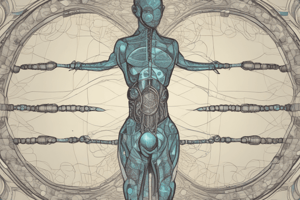Podcast
Questions and Answers
What is behavioral genetics?
What is behavioral genetics?
What are chromosomes?
What are chromosomes?
Threadlike structures made of DNA molecules that contain the genes.
What is DNA?
What is DNA?
A complex molecule containing the genetic information that makes up the chromosomes.
What is a gene?
What is a gene?
Signup and view all the answers
What is a genome?
What is a genome?
Signup and view all the answers
What are fraternal twins?
What are fraternal twins?
Signup and view all the answers
What are identical twins?
What are identical twins?
Signup and view all the answers
What is heritability?
What is heritability?
Signup and view all the answers
What does it mean to interact?
What does it mean to interact?
Signup and view all the answers
Who is an evolutionary psychologist?
Who is an evolutionary psychologist?
Signup and view all the answers
What is natural selection?
What is natural selection?
Signup and view all the answers
What are mutations?
What are mutations?
Signup and view all the answers
What are monozygotic twins?
What are monozygotic twins?
Signup and view all the answers
What are dizygotic twins?
What are dizygotic twins?
Signup and view all the answers
What are separated twins known for?
What are separated twins known for?
Signup and view all the answers
Study Notes
Behavioral Genetics
- Examines how genes and environment influence behavior.
- Focuses on the extent of genetic versus environmental contributions.
Chromosomes
- Composed of DNA, these structures carry genetic information.
- Contain genes, which are the basic units of heredity.
DNA
- A complex molecule that encodes genetic information.
- Forms the structure of chromosomes.
Gene
- Segments of DNA that direct the synthesis of proteins.
- Fundamental units of heredity across organisms.
Genome
- Represents the complete genetic blueprint of an organism.
- Contains all genetic material required for development and functioning.
Fraternal Twins
- Also known as dizygotic twins.
- Arise from two separate fertilized eggs, sharing about 50% of their genes.
Identical Twins
- Also referred to as monozygotic twins.
- Formed from a single fertilized egg that divides, sharing 100% of their genetic material.
Heritability
- Measures the degree to which variation in a trait is attributable to genetic differences.
- Heritability estimates can fluctuate depending on the population and environment studied.
Interaction
- Refers to how the impact of one factor (like environment) can depend on another (like genetics).
- Highlights the complex interplay between genetics and environmental influences on behavior.
Evolutionary Psychology
- Investigates behavioral and mental processes through the lens of natural selection.
- Aims to understand the evolutionary basis for various psychological traits and behaviors.
Natural Selection
- A principle where traits that enhance survival and reproduction are more likely to be passed to future generations.
- Key mechanism of evolution affecting genetic diversity.
Mutations
- Refers to random changes during gene replication that introduce new variations.
- Can lead to beneficial, neutral, or harmful effects on an organism.
Monozygotic Twins
- Identical twins formed when a single fertilized egg splits, resulting in two genetically identical individuals.
Dizygotic Twins
- Fraternal twins that develop from two separate fertilized eggs, sharing roughly 50% of their genetic characteristics.
Separated Twins
- Twins raised in different environments can still display remarkably similar behaviors, suggesting genetic influences are strong.
Studying That Suits You
Use AI to generate personalized quizzes and flashcards to suit your learning preferences.
Description
Explore the key concepts in behavioral genetics with these flashcards designed for AP Psychology students. Each card covers essential terms like chromosomes, DNA, and genes, providing a concise definition to enhance your understanding of the subject. Perfect for quick reviews or exam preparation!




